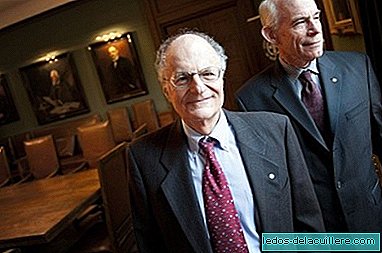
In the image you can see the winners of the Nobel Prize in Economics of the year 2011. Is about Thomas J. Sargent and of Christopher A. Sims They got it in recognition of their research on the effects of political measures on the economy. In 2011 Thomas J. Sargent gave a speech in Berkeley that lasted exactly two minutes and in which he used the decalogue format, although in this case there are twelve, to highlight the concepts and ideas he wanted to convey to his students. Reviewing the content of the speech, which can be read in full below, it seems necessary that these ideas begin to teach and disseminate in primary education.
And in addition to teaching how personal finances can be managed It also allows us to know what happens when debts that cannot be paid are acquired, how human behavior affects the economy, that commercial and domestic activity maintain many relationships and that common sense is one of the most useful for managing any type of economy.
Then the speech by Thomas J. Sargent. Below is the link to the original discourse that has been recently remembered by economists Craig Newbark and Mark Perry:
"I remember how happy I felt when I graduated from Berkeley many years ago. But I thought graduation speeches were too long. I will economize on words. The economy is based on common sense. Here you have a short list of the valuable lessons that our beautiful matter teaches. "
- Many of the things that are desirable are not feasible
- Individuals and communities have to make concessions
- Others have more information about their abilities, their ability and their preferences than you
- Everyone responds to incentives, including the people you want to help. That is the reason why social protection programs do not always work as they should
- We must find an intermediate point between equality and efficiency
- In a balanced game or economy, people are satisfied with their choices. That is why it is difficult for well-intentioned agents outside the system to change things for the better or for the worse
- In the future, you will also respond to incentives. That is the reason why there are some promises that you would like to make but you cannot. No one will believe those promises because they know that, later, you will have no interest in keeping them. The lesson here is as follows: before making a promise, think about whether you want to keep it even when your circumstances change. This is how you build your reputation
- Governments and voters also respond to incentives. That is the reason why governments often do not pay their debts or breach other promises they have made.
- For one generation it is feasible to transfer their debts to the following. That's what American social security and national public debt do (but not Singapore's social security system)
- When a government spends, its citizens will finally pay, either today or tomorrow, through explicit or implicit taxes such as inflation
- Most people want others to pay for public goods and for government transfers (especially those they receive)
- Since market prices aggregate information from different traders, it is difficult to forecast stock prices, interest rates and exchange rates
Although all the phrases seem very good and reasonable to me, for someone who is also specialized in knowing the effects of political measures on the economy, perhaps the one I like the most is that individuals and communities have to make concessions.












